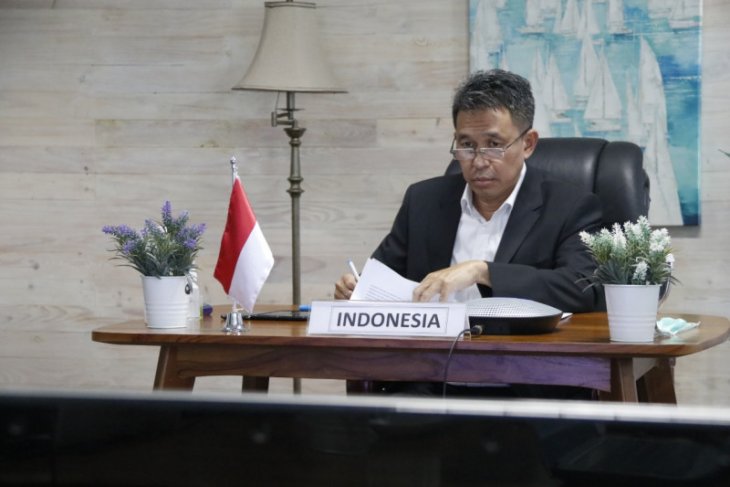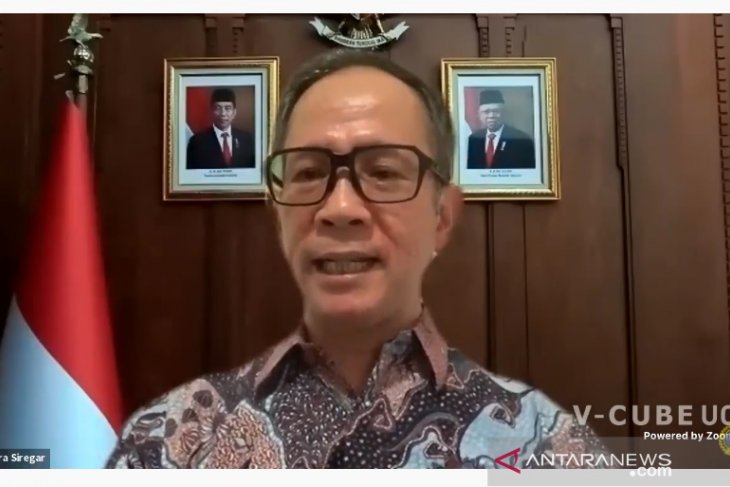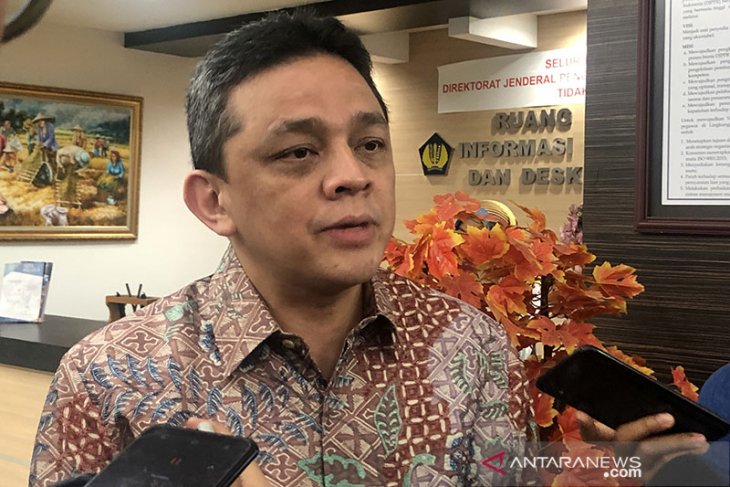Live Streaming
Program Highlight
Company Profile

Ani Hasanah
Indonesian Broadcasting Commission (KPI) Organizes Child Friendly Broadcasting Award (APRA) 2020
Jakarta (VOI News) - The Indonesian Broadcasting Commission (KPI) in collaboration with the Ministry of Women's Empowerment and Child Protection (KPPPA) again gave awards to child-friendly television and radio programs through the 2020 Child-Friendly Broadcasting Award (APRA). Minister of Women Empowerment and Child Protection (PPPA) I Gusti Ayu Bintang Puspayoga in her virtual remarks at the 2020 Child-Friendly Broadcasting Award (APRA), Saturday (29/8), said that children have human rights that must be fulfilled just like adults. She also gave her appreciation to the Indonesia Broadcasting Commission (KPI) for holding the award for the child-friendly television and radio.
"So I really appreciate the 2020 child-friendly broadcasting award, which is an award event for broadcasters that provide weighty and educational shows for children. In the midst of the sluggish segmentation of children on television and radio broadcasts, of course, this activity is expected to motivate broadcasters to continuously produce child-friendly programs both in terms of quantity and quality," said I Gusti Ayu Bintang Puspayoga.
Previously, KPI Commissioner Mimah Susanti in a virtual press conference in Jakarta, Saturday (29/08) said that even in pandemic conditions, the Indonesian Broadcasting Commission still held the Child-Friendly Broadcasting Award (APRA) as a form of appreciation for the contribution of broadcasting institutions in presenting good quality programs. for children.
"With all its limitations, the Indonesia Broadcasting Commission (KPI) still wants to give appreciation to programs, both to television and radio personnel, for quality children's programs. So we hope that with this situation of limitation, we still want Indonesian children, even though they spend all their time at home, can still be active and also be given good broadcasting programs," said Mimah Susanti.
This year's award has ten categories namely: Indonesian Children's Animation Program, Foreign Child Animation Program, Documentary Program, Variety Show Program, Feature Program, Indonesian Children's Education Program, Radio Children's Program, Child Care Radio Program 2020, Best Children Television Program, and Best Child-Friendly Television 2020. RRI Wamena won the Radio Children Program category through the Wamena Children Song and Learning program (LABEWA) while the 2020 Child Care Radio Program category was won by RRI Pontianak through the Children World program. (VOI / AHM)
August

Director general of marine spatial management at the Marine Affairs and Fisheries Ministry, Aryo Hanggono. (ANTARA/HO-KKP)
The Marine Affairs and Fisheries Ministry has declared Pieh Island in West Sumatra as a conservation area and migration route for sea mammals.
"Conservation of sea mammals’ habitat and migration route has been established in some areas, including at the Marine Tourism Park (TWP), Pieh Island," the ministry's director-general of marine spatial management, Aryo Hanggono, said in a statement in Jakarta on Saturday.
Hanggono said Indonesia has at least 33 species of cetaceans (whales and dolphins), or over a third of the total cetacean species found in the world.
The infraorder Cetacea is a key component in the food chain, along with other major predators, hence, any disturbance in its population affects the entire food chain, he noted.
"Considering these roles, we need to protect and preserve the existence of Cetacea, especially in Indonesian waters," he added.
The ministry has issued a ministerial regulation (no. 79/2018) on the national action plan for sea mammals in 2018-2022, which is aimed at protecting sea mammals, maintaining their stable population, and developing sustainable economic benefits from the species.
Head of the National Marine Conservation Area (LKKPN), Fajar Kurniawan, said sea mammals in Pieh Island have become a focus of conservation, in addition to coral reefs and turtles.
Data on sea mammal appearance in the last five years will be used as a basis for their management in the area, according to officials. (ANTARA)
August
 A screenshot of Vice Foreign Minister Mahendra Siregar during a virtual seminar "Batik: Cultural Heritage and Creative Economic Asset of Indonesia" held at the Foreign Ministry on Friday (Aug 28, 2020). (ANTARA/Suwanti)
A screenshot of Vice Foreign Minister Mahendra Siregar during a virtual seminar "Batik: Cultural Heritage and Creative Economic Asset of Indonesia" held at the Foreign Ministry on Friday (Aug 28, 2020). (ANTARA/Suwanti)
The diplomatic education curriculum will feature batik as a subject as part of the Foreign Ministry’s endeavors to strengthen and sharpen Indonesian batik diplomacy abroad, Vice Foreign Minister Mahendra Siregar stated.
"Batik subject will especially be included in the module or curriculum of diplomatic education," he remarked during a virtual seminar "Batik: Cultural Heritage and Creative Economic Asset of Indonesia" held at the Foreign Ministry on Friday.
"That has become (our) commitment, and a team of the education and training center along with experts are in the process of drafting it," he noted.
The Foreign Ministry has, since long, introduced batik in foreign countries. In 2008, Indonesia had launched a campaign to rally support for the nomination for batik's inscription into UNESCO's Representative List of the Intangible Cultural Heritage of Humanity.
UNESCO officially declared batik as an intangible cultural heritage on October 2, 2009. National Batik Day has been observed annually ever since.
In the run-up to the 11th National Batik Day, the Foreign Ministry has been readying several activities to intensify batik promotion since batik is an integral part of the Indonesian diplomacy.
"We would like to strengthen and sharpen an integrated promotion or marketing program. Although we have, so far, conducted promotion programs, they are sometimes incidental," he stated.
“The ministry will also directly contribute to responding to the needs of Indonesian batik producers and craftsmen in the wake of the pandemic," Siregar noted. (ANTARA)
August

Director-General of Financing and Risk Management of the Finance Ministry Luky Alfriman. ANTARA/Astrid Faidlatul Habibah/pri.
Director-General of Financing and Risk Management of the Finance Ministry Luky Alfriman drew special attention to the three major focus areas of the government's agenda to address the impacts of the COVID-19 pandemic.
"The government is present to ensure that the economy is healthy, and the people are still in good health," he noted at an online discussion in Jakarta on Friday.
The first emphasis of the government's agenda is to maintain the health sector since the number of COVID-19 cases in Indonesia has shown a steady rise to reach up to 162,884 until Thursday (Aug 27), he stated.
The second area of priority is to maintain the purchasing power of the public, especially those from the middle- to the low-income group. To this end, the government has launched several stimuli as part of the national economic recovery (PEN) Program, he remarked.
The third focus remains on ensuring that activities of the business world continue to run in the wake of the COVID-19 pandemic. To this end, the government has provided various incentives as part of the PEN Program, he revealed.
"We do not want to see bankruptcy or layoffs," he affirmed.
Alfriman remarked that the COVID-19 pandemic has had an extraordinary impact on the national economy, with economic growth in the second quarter recording a contraction of up to 5.32 percent.
However, the figure is lower than those of Great Britain and Spain that touched minus 21 percent, while those of the Philippines, Malaysia, and Singapore reached minus 10 percent.
"It (the contraction) was clocked in almost all components. The growth of household consumption, investment, exports, imports, and government consumption contracted in the second quarter," he remarked.
The three focus areas that need the government’s stimuli have raised spending, while state revenues had come under pressure, leading to a fairly large deficit of 6.34 percent of the gross domestic product. (ANTARA)


